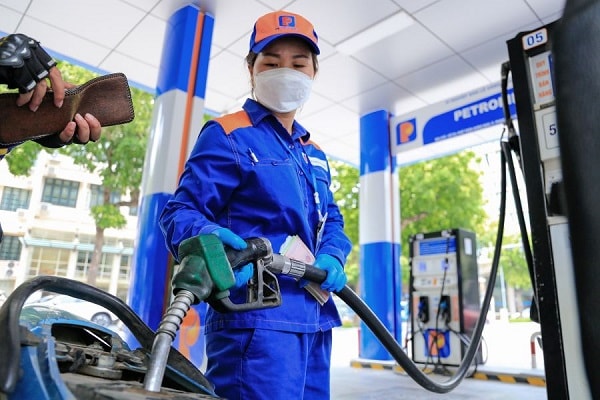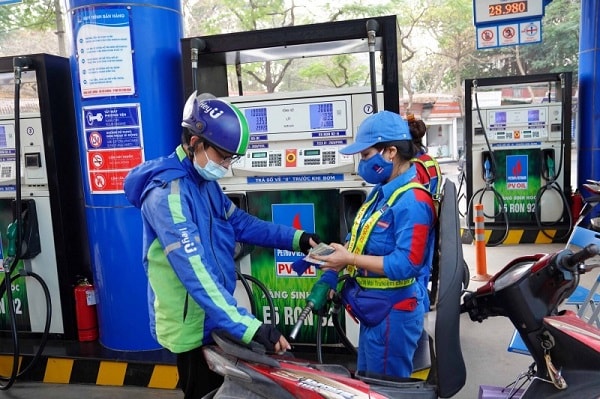Should environmental taxes on fuel be abolished?
The ongoing 50% reduction in environmental taxes on fuel is viewed as a viable strategy for economic recovery. However, some argue that this tax should be eliminated entirely...

The continued 50% reduction in environmental taxes on fuel is seen as a practical measure for economic recovery. Illustrative photo.
Reducing Taxes to Support Businesses
The Ministry of Finance recently released a document soliciting comments from related ministries and agencies on a plan to continue lowering the environmental protection tax (EPT) on gasoline in 2025 through an accelerated approach.
The Ministry of Finance recommends a sustained 50% decrease in EPT for gasoline (excluding ethanol), oil, and lubricants in 2025, a 70% reduction for aviation fuel, and a 40% reduction for kerosene. Following the reduction, the EPT rate for gasoline would be 2,000 VND per liter, 1,000 VND per liter for aviation fuel, 1,000 VND per liter for diesel oil, mazut oil, and lubricating oils, 1,000 VND per kilogram for lubricating grease, and 600 VND per liter for kerosene.
"The economy is gradually recovering in 2025 but still faces many factors that could impact growth. The proposed reduction in EPT on fuel aims to stabilize domestic retail fuel prices, supporting both citizens and businesses," stated the Ministry of Finance.
According to the Ministry, assuming no changes in the base price structure of fuel from the most recent regulatory period, the retail price of gasoline (excluding ethanol) would decrease by 2,200 VND per liter; aviation fuel by 2,200 VND per liter; diesel oil, mazut oil, and lubricating oil by 1,100 VND per liter; lubricating grease by 1,100 VND per kilogram; and kerosene by 440 VND per liter. These reductions include VAT reductions.
With predicted gasoline, oil, and grease use in 2025 similar to 2024, a reduction in EPT on fuel will cut the 2025 budget by roughly 44.224 trillion VND.
To maintain continuity and timeliness, the Ministry of Finance proposes that the resolution be effective from January 1, 2025 to December 31, 2025. EPT tariffs for these goods will return to those specified in Resolution No. 579/2018/UBTVQH14 beginning January 1, 2026.
Expert Opinions
Speaking on the subject, Associate Professor Dr. Dinh Trong Thinh, senior professor at the Academy of Finance, feels that the proposal to prolong the 50% EPT cut on fuel is both essential and advantageous. Fuel is a crucial commodity and a critical ingredient for many manufacturing sectors, therefore price variations have a wide-ranging influence on the economy. In the present environment, where businesses confront multiple obstacles, lowering EPT on fuel would assist to reduce input costs.
Dr. Thinh noted that extending the tax reduction would not hinder environmental protection goals, as the increase in fuel consumption would not be substantial. Furthermore, in FTAs and multilateral forums in which Vietnam participates, there are no binding commitments to control fuel consumption. Thus, reducing the EPT on fuel does not violate international environmental commitments, including the Kyoto Protocol on climate change and the UN Framework Convention on Climate Change.
Currently, fuel prices in Vietnam are subject to four types of taxes: VAT, excise tax, environmental tax, and import tax. Environmental tax on fuel is already at the maximum reduction according to Resolution No. 20/2022/UBTVQH15 dated July 6, 2022, by the National Assembly Standing Committee. Overall, taxes account for 18.5% of the price of A92 gasoline and 19.2% of A95 gasoline, while for oil, they make up 7-9%.

Over the long term, if this tax remains, transparency in the use of environmental tax revenues on fuel is necessary. Illustrative photo.
Should It Be Abolished Altogether?
Supporting the proposal to reduce EPT on fuel to assist citizens and businesses, Associate Professor Dr. Ngo Tri Long, former Director of the Price Market Research Institute (Ministry of Finance), also stressed that, in the long run, transparency in the use of environmental tax revenue on fuel is essential if the tax continues to be levied.
According to Dr. Long, the EPT should be allocated exclusively to environmental protection, but this has yet to be transparently disclosed. As a significant revenue source, it must be spent effectively and aligned with its intended purpose to avoid waste. The Ministry of Finance should ensure transparency in its handling of the hundreds of trillions of VND collected through this tax. While the EPT is a financial tool for mitigating environmental damage, under current circumstances, it should be set at the lowest feasible level to support businesses and the public.
"In principle, to secure revenue, the tax base must be nurtured. However, in the challenging global economic climate, the government should adopt policies that alleviate burdens on citizens, fostering a favorable environment for business recovery. Continuing the 50% EPT reduction is essential, given the post-pandemic economic struggles," Dr. Long emphasized.
On a different note, economist Bui Trinh argued that the EPT on fuel merely increases fuel prices, which is detrimental to both the public and the economy. "In my view, EPT on fuel should be abolished altogether to support citizens and businesses during these difficult times. If the tax is to be retained, ministries and agencies should conduct thorough research and provide transparent scientific justification," he suggested.








